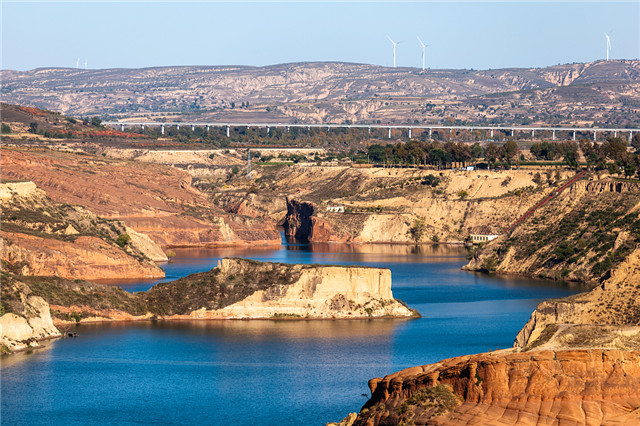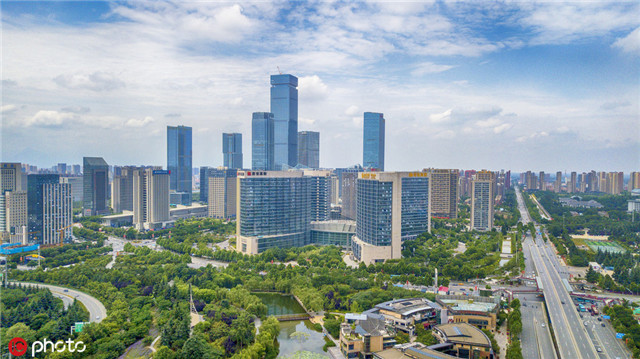Shaanxi's advantages for investment


Location
Located in the hinterland of the Chinese mainland and the middle reaches of the Yellow River, Shaanxi province is adjacent to Shanxi and Henan provinces to the east, and Ningxia Hui autonomous region and Gansu province to the west. To the south are Sichuan and Hubei provinces and Chongqing municipality, and to the north, Inner Mongolia autonomous region.
Transportation
Shaanxi province, believed to be one of the key birthplaces of Chinese civilization and Huaxia culture, was the starting point of the ancient Silk Road. The province has a three-dimensional transport network extending in all directions. The high-speed rail network centering on Xi'an, the capital city of Shaanxi province, has developed rapidly over the years, making the city an important transport hub. The China Railway Express (Xi'an), also known as the China-Europe freight train, made 1,235 trips in 2018, ranking first in the country. By the end of 2018, Shaanxi province had developed total expressway length exceeding 5,475 kilometers, ranking at the forefront across the country.
Scientific research
Shaanxi has attached great importance to scientific and technological innovation, and its technological innovation capability has improved significantly in recent years. In 2018, the province's comprehensive assessment index of the Level of Science and Technology Innovation was 66.58, ranking ninth in the country. Shaanxi put 46.09 billion ($6.68 billion) yuan into research and development spending in 2018, ranking at eighth places in China. There are 1,174 scientific research institutions and 80 institutions of higher learning in Shaanxi, including three universities listed in China's 985 and eight in the national 211 key university national projects.

Resources
With a history of more than 1,000 years of providing capital cities, Shaanxi province has a wide range of cultural relics and a rich heritage in unique human landscapes, such as Emperor Qin Shi Huang's Mausoleum Site Museum, the Famen Buddhist Temple, the Huashan Mountain and Hukou Waterfalls.
Rich in mineral resources, 138 mineral species have been discovered in Shaanxi. Of the 93 types of minerals with proven reserves, Shaanxi has reserves of 57 that rank in the top 10 in China. In the province's northern regions, there are abundant mineral resources including high-quality coal, petroleum, natural gas, rock salt and clay. The Guanzhong Plain and adjoining areas have rich coal, materials for building construction, terrestrial heat and mineral water, while the Qinba mountainous area in the southern parts of Shaanxi has nonferrous, precious and ferrous metals, and various nonmetallic minerals.

Shaanxi's economic situation in 2018
In 2018, the province's GDP was 2.44 trillion yuan, increasing by 8.3 percent year-on-year. Among them, the added value of the primary industry sector was 183.02 billion yuan, increasing by 3.2 percent year-on-year; the added value of the secondary industry sector was 1.22 trillion yuan, a year-on-year increase of 8.7 percent; and the tertiary industry climbed to 1.05 trillion yuan, up 8.8 percent year-on-year. GDP in the primary, secondary and tertiary industries was 7.5 percent, 49.7 percent and 42.8 percent. Its per capita GDP was 63,477 yuan, an increase of 7.5 percent year-on-year.
In recent years, Shaanxi has focused on setting up a modern industrial system. The province is pushing forward the transformation and updating of traditional industries, speeding up the development of emerging strategic industries, and achieving a leap forward to the middle and high-end in the value chain in advanced equipment manufacturing, integrated circuits and new energy automobiles.
MOST POPULAR
- 1 Record trade bodes well globally
- 2 China updates Catalogue of Encouraged Industries for Foreign Investment
- 3 China's commerce ministry to boost consumption, opening-up in 2026
- 4 China's auto production, sales rank first globally for 17th consecutive year
- 5 China remains world's largest online retail market for 13th straight year
Editors' Picks
 Call for feedback:
2026 Share your views on innovation in China
Call for feedback:
2026 Share your views on innovation in China






